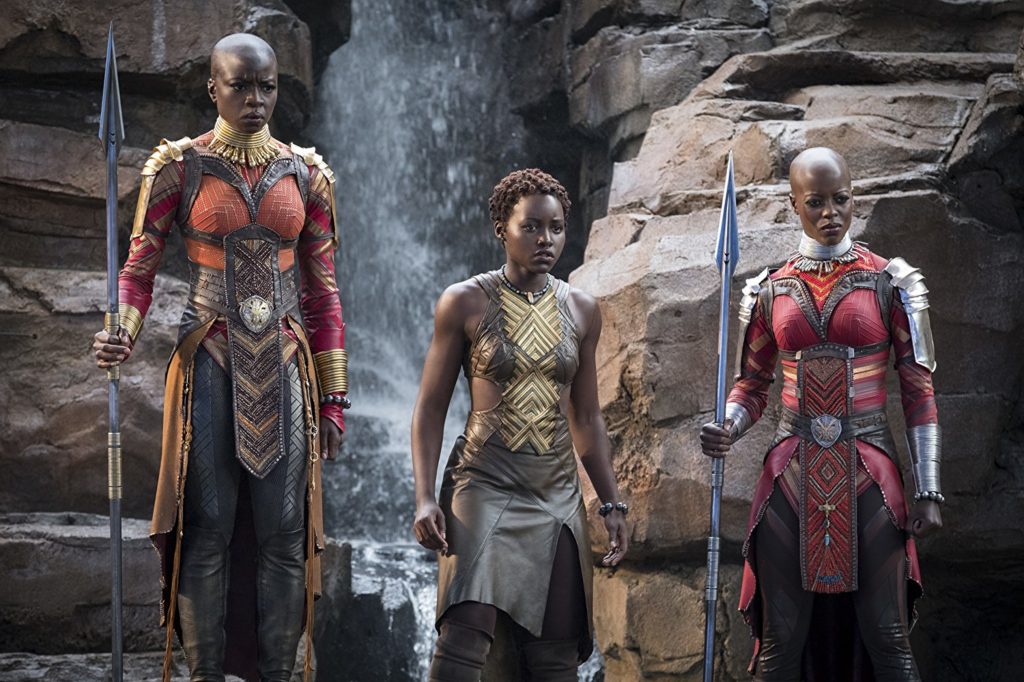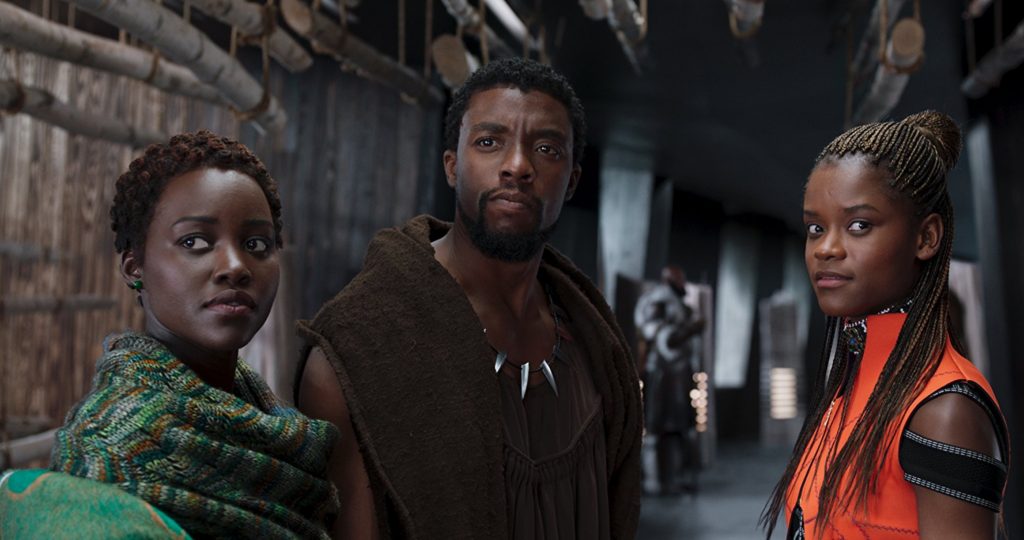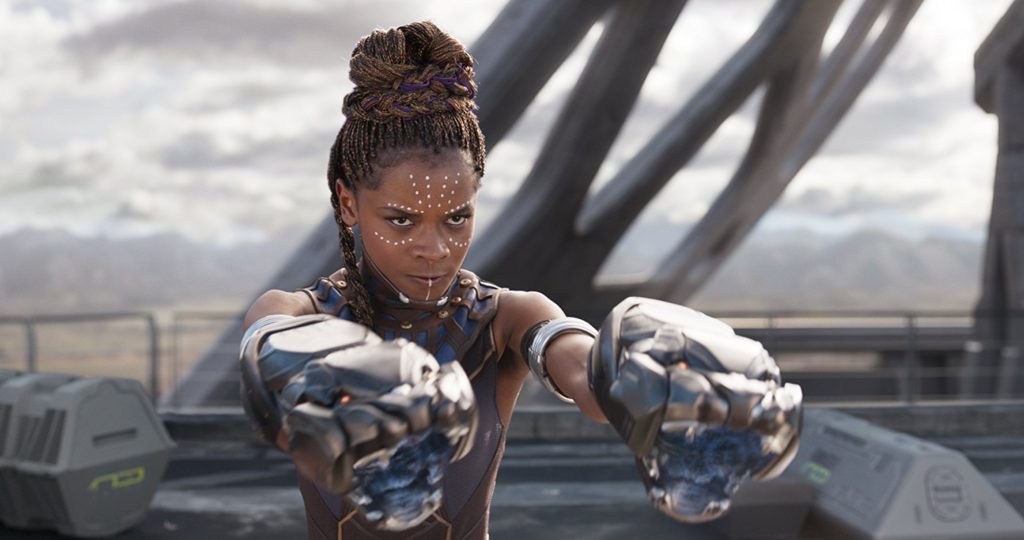Black Panther, directed by Ryan Coogler (Fruitvale Station, Creed), is undoubtedly one of the greatest films I have ever had the opportunity to watch.
The first time I watched the film, another Black tidda and I went together, so we could experience the magic with each other. We laughed at moments others in the theatre did not laugh. My body was covered in goosebumps and I wanted to cry when T’Challa visited his ancestors and father. We grabbed and shook each other and resisted the urge to laugh for more than a minute when Shuri delivered the legendary line “Don’t scare me like that, coloniser!”
When the credits started rolling I remember placing my hand over my heart and saying, to anyone who was listening, “My heart is full.” I wanted to embrace all the women in the film when I walked out. I didn’t want to leave the theatre; I didn’t want to say goodbye to Wakanda. It’s why I went back to watch it again, twice.
The women in Black Panther are exceptional. They are multidimensional: emotional, hilarious, empowered and empowering. They are strong; not because something terrible and traumatising was inflicted upon them and their character’s arc, but they are strong because they are strong.
 Ramonda (Angela Bassett) is staunch and wise, a protective mother. Shuri (Letitia Wright) is a hilarious genius, and has a heart made of gold. Okoye (Danai Gurira) is the human embodiment of strength, loyalty and protection. She never waivers from her beliefs and when she gets angry you’ll want to listen, or else. Nakia (Lupita Nyong’o), dreams of a better world. She cares so much about others and just like Okoye, she gets angry, and is never shamed for being angry.
Ramonda (Angela Bassett) is staunch and wise, a protective mother. Shuri (Letitia Wright) is a hilarious genius, and has a heart made of gold. Okoye (Danai Gurira) is the human embodiment of strength, loyalty and protection. She never waivers from her beliefs and when she gets angry you’ll want to listen, or else. Nakia (Lupita Nyong’o), dreams of a better world. She cares so much about others and just like Okoye, she gets angry, and is never shamed for being angry.
As a Black Indigenous woman I felt seen in this movie, because the film depicted so many parallels of Black women here in Australia. Specifically, that Black women are angry; however, in Wakanda their anger is respected, not belittled or erased.
Every Black girl is all too familiar with the ‘Angry Black Woman’ trope. This stereotype is used to silence and ridicule Black women. Imagine that years ago your home was colonised and ever since, your land has been dying, your people have been deteriorating from history, from the edges of your memories, from life itself. Imagine that you will never get to speak your mother tongue, the tongue your ancestors have been speaking since the first sunrise. Of course you’d be angry.
Now imagine being shamed by your oppressors for your anger. You’re no longer allowed to be angry. Now being angry is exhausting and a pain, because you are ridiculed and humiliated for feeling this way.
Being angry was all you had, but they took that away from you too.
You have to behave now. Be the good girl, be the nice girl, be the perfect little Black girl your invaders expect you to be. Don’t you dare ever have an opinion. You’ll be labelled as angry and anger has never been a good look on your people. Emphasis on your people—because your oppressors are allowed to be angry. You, never. Imagine this thought process. Now imagine it eating away at the minds of young Black girls, all Black girls.
This is reality for so many Black women. We don’t need to imagine such things, because it is happening right now, as we speak.
 Wakanda showed me that we have every right to be angry. That our feelings are valid. We are not property, we will not silence ourselves, you will not silence me. You will never silence us. We will rise as angry Black women, and you will respect us.
Wakanda showed me that we have every right to be angry. That our feelings are valid. We are not property, we will not silence ourselves, you will not silence me. You will never silence us. We will rise as angry Black women, and you will respect us.
To see angry Black women get the respect they deserve was a profound experience, and one that up until now was something unimaginable. Seeing Black women treated this way on film is important, for not only the empowerment of Black women, but to show those around us the right way to treat us.
Black Panther presenting Black women as multifaceted, complex characters who were fierce and resilient is the thing I appreciated the most about the film. I hope little Black girls everywhere get angry and grow up in a world where they are never shamed for it.
Thank you, Ryan Coogler, for directing a masterpiece. Thank you Danai Gurira, Lupita Nyong’o, Angela Bassett and Letitia Wright for playing people I can look up to. Thank you for being inspirational, strong and empowering women in real life too. Thank you to all the Black women in the world for keeping me going. Thank you to the Black women in Australia, both Indigenous and non-Indigenous; your strength and anger are gifts and are constant reminders to never be silent. Thank you to the Black women whom I am lucky enough to call my mums, my aunties and my grandmas; you keep me connected and without any of you, the threads that make me whole would all be undone. Thank you to all the Black women reading this.
And as always – Wakanda Forever!
All images sourced from IMDb
About the author
Meleika Gesa-Fatafehi is a proud Black/Indigenous, Pasifika and West Asian writer. Their mob is from Murray (Mer) Island, from the Zagareb and Dauareb tribes. Meleika is also a literature and film critic; you can find her rambling at Endless Yarning, RadioNZ and NerdyPoC. She loves talking about all things nerdy, as well as decolonising spaces online and in real life.




1 Comment
“Thank you…”
To Stan Lee and Jack Kirby, the two Jewish guys who created Black Panther in the first place.
Are they not worth a mention?